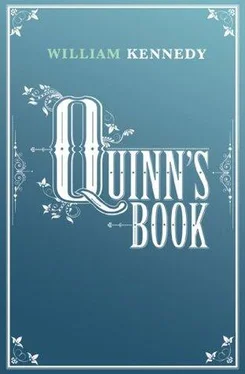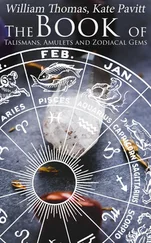Will led us to a secondary entrance of this enormous house, where we were met by Capricorn, who expected us. We followed him through a long corridor, down two dozen steps to a basement, and then, by the light of Maud’s torch and Capricorn’s lamp, we walked the length of the enormous cellar to a cavelike room whose existence became obvious only after Joshua moved two foundation timbers, which were, in fact, a door.
We lowered Joshua to a padded pallet that lay ready on the floor, and the manacles cut again into his wrist, shooting agony even through me. Capricorn squatted beside Joshua to study his condition, then rose and spoke to us.
“I thank you gentlemen, and you, too, Master Daniel,” he said. “I’ll take care of him now.”
He turned back to Joshua, and as he did so, his lamp cast a beam into the deeper region of the cave and I caught sight of three forms, one a female, all Negro, all crouching in the darkness. I gave off a startled grunt and Will saw my surprise.
“Whatever you see, boy,” he said to me, “you see nothing,” and he shook a finger in my face. “Nothing.”
I nodded at this and he added, “I’ll join you in a few minutes at the mausoleum to bring in the coffin,” and Maud, John, and I retreated from the cave while Will conferred with Joshua. As we went my master remarked, “They got themselves a regular nigger factory in there.”
“You mustn’t use that word,” said Maud.
“What word might that be?” said John.
“You know what word I mean,” said Maud, “and if you use it again in my presence, I shall find a hatpin and stick you with it.”
John shut his mouth at that, the first of his many silencings by Maud, and we retraced our steps to the mausoleum. Will eventually enlightened me on Joshua, an intrepid fugitive from Virginia who had escaped from slavery, later returned to Virginia by stealth to free his woman, and on subsequent trips led six other slaves through the night forests to freedom in the North. He had been recently captured near Albany by slave hunters, the quest for him sweetened by a three-hundred-dollar reward, and he was jailed under the federal law that honored the property rights of Southern slaveholders.
News of a fugitive slave’s capture reached Will Canaday at the newspaper and he discovered it was Joshua in custody. A conspiracy among antislavers to snatch Joshua away from the law was plotted, but the day’s madness intervened yet again: the driver of the carriage transporting the prisoners to a southbound train was struck by a flying prism of ice, and before Will Canaday and his conspirators could intervene, Joshua and the Swede to whom he was manacled took the reins themselves, fled from both captors and liberators, lashing the horses into such furious flight that at one turning both men were thrown off the carriage, whereupon they fled by foot to the sanctuary offered by the mausoleum of Amos Staats, where Will found them. Once inside the tomb, which over the years had become as much a storage shed as a burial site, the Swede decided that death was his destiny. He choked the weakened Joshua out of his lights with a single hand, and then, with a length of rope, hanged himself with great skill and effectiveness, full certain, I conclude, that no horrors of the beyond could match those of this world.
We waited in the mausoleum and Will returned presently. Then we three, two men and a boy, with Maud lighting our way, lifted Amos from what proved not to be his final resting place, carried him up from the earth and into the Dood Kamer , which was thereby hosting its second resurrection of the evening, and placed his coffin on the same raised platform from which Magdalena had arisen. The coffin was remarkably clean and dry in spite of its years of burial, and the odor of its occupant’s decay had been banished by time.
The entire household, servants included, gathered in front of the coffin when we set it down, witnesses all to sanctity disturbed, a hero encased, though I knew nothing of Amos’s history in the Revolution at that moment. The coffin had been hand-hewn by Amos’s father, Jacobus, who had also sealed its edges and surfaces with a substance waxen to the touch and which seal I now could see had been broken, an infinitesimally fine crack running the length of coffin where the lid closed.
“I would like to see what he looks like,” Maud said.
“Dead these seventy-odd years, he wouldn’t be a pretty sight, child,” said Hillegond, more amused than affrighted by Maud’s suggestion. But Maud did not wait for approval. She walked to the coffin and lifted the lid on a stunning sight: Amos in his soldier’s cap and uniform, arms crossed on his chest, a warrior’s medal over his heart, lying as if asleep. His skin was a gray transparency, the color of exhausted night, the perfection of his death exuding a radiance that awakened swooning sounds in the onlookers.
“He hasn’t decayed,” said Will. “An amazing achievement. It must be the way the coffin was sealed.”
“I always thought corpses rotted from the guts out,” said my master.
I moved alongside Maud, and as naturally as breath itself we intertwined our hands and stared at Amos from the end of his coffin.
“He’s so beautiful,” Maud said. We stared together at his beauty until she turned her gaze to my own face. “And you are beautiful as well,” she said, and she kissed me with her mouth upon my mouth. She kept her mouth there and my arms went ’round her. We kissed under the spell of death’s beauty, then stopped kissing to gaze again at Amos.
“Oh my God, look what’s happening to him,” said Magdalena. His face had begun to swell: cheeks, forehead, neck, eyelids all rising as might a loaf of leavening bread, a shocking sight from which we could not take our eyes. And then he exploded — his perfection, I suggest, rent by the air of our pernicious age — exploded upward and outward, his hands and face disappearing beneath a great grayish puff of dust tinged with pale blue, a puff that ascended fully six feet above the coffin and spread over us all in a melancholy haze. The dust demarcated the end of something, the final burst of heroism, perhaps, whose like was no longer accessible to our commonplace lives. The sadness of lost glory was implicit, most especially to Maud, who cried as if a demon held her in its jaws. She clutched me, threw her arms about my neck and kissed me again with passion and energy, ground her pelvic center against my own and kissed all of my face with a ferocious gluttony.
She kissed me, she kissed me, and I kissed in return, quite well, too, I thought; for in one sweet instant she had taught me the true purpose of the lips in matters of profound affection. The dust was falling onto our heads and shoulders, the air slowly clearing; and though we did not interrupt our kissing, I could see from my eye’s corner that the face of Amos was gone, as were his hands. His chest had collapsed, as had his legs, so that the uniform seemed to have lost its inhabitant entirely, replaced by a skeletal stranger. Having seen this and understood none of it, I returned my eyes to Maud and kissed on until we were pulled apart by angry hands and a wild woman’s scream; and I turned to face Magdalena, who slapped me viciously across the cheeks: front of the hand, back of the hand.
“Loutish child,” she yelled.
I forgave Magdalena her anger but I ripped myself away from her and again thrust my face against Maud’s, kissing with all my soul until they rent us yet anew. In the frenzy that followed I remember uppermost a remark by Hillegond. “They are fortunate children,” she said. “They know love.”
But fortunate was not the word for what was to become of us.
THEY SEPARATED US that night, Maud and me, and we slept in isolation with our newborn love. I made no protest. I had no rights where she was concerned, though I cared nothing at all for rights when it came to her presence in my days. She, contrarily, complained vigorously about her aunt’s behavior toward me, argued that I, more than anyone else alive, had the right to her company, for without me she would have been on the river bottom with Magdalena’s doll. In outrage over the situation she refused to eat.
Читать дальше












